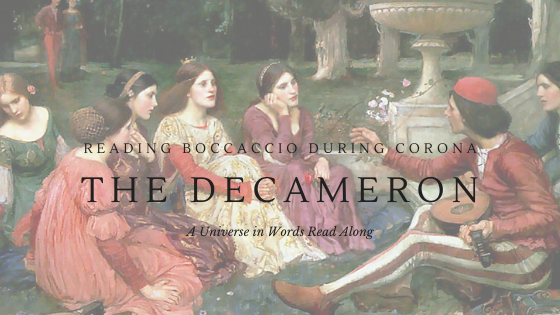The Decameron: Reading Boccaccio during Corona
As some of you may know, I currently live in Shanghai, which means that the setting of The Decameron has become beautifully relevant to me all of a sudden. In Boccaccio's collection of tales, seven young women and three young men have hidden themselves away behind a deserted villa's walls to sit out the Black Plague as it ravishes 14th century Italy. While the Corona virus isn't quite as horrifying as the Black Plague (at the moment at least), it has been enough for all of us to be put on extended leave. Hence, I will be spending the next ten days hidden away in my own apartment, desperate to amuse myself and to forget what's happening outside. My tiny apartment may not be a villa and I may be there on my own (+ cat), but it is the place where I will be joining Boccaccio's hideaways.
Starting from the 31st of January, I will be reading a "day" per day, meaning that by the 9th of February, the day we are technically returning to work, I'll have finished not only The Decameron but also my self-imposed house arrest. Each day I will be reading and then re-capping and discussing in a post here.
Boccaccio completed The Decameron in 1353, most likely inspired by an epidemic that took place only five years earlier. The tales in this book speak of wit, fortune, human will, love, and, apparently, the contrast between the lives of men and women. In writing this work, Boccaccio was inspired by Dante's Divine Comedy (1321), another famous medieval tale. Boccaccio was actually the one to add the 'Divina' to what was before then known only as the 'Comedia'. His collection of tales is also occasionally called 'The Human Comedy'. Boccaccio in his own turn influenced works such as the famous The Canterbury Tales (c. 1400) by Chaucer. As I set out on this literary quest, I am interested to see where The Decameron falls between these two famous works.
A hundred tales told across ten nights by ten youths and spanning over a thousand pages. Here we go!
1/31 - The First Day
Thank you all very much for joining me the past eleven days!
Starting from the 31st of January, I will be reading a "day" per day, meaning that by the 9th of February, the day we are technically returning to work, I'll have finished not only The Decameron but also my self-imposed house arrest. Each day I will be reading and then re-capping and discussing in a post here.
Boccaccio completed The Decameron in 1353, most likely inspired by an epidemic that took place only five years earlier. The tales in this book speak of wit, fortune, human will, love, and, apparently, the contrast between the lives of men and women. In writing this work, Boccaccio was inspired by Dante's Divine Comedy (1321), another famous medieval tale. Boccaccio was actually the one to add the 'Divina' to what was before then known only as the 'Comedia'. His collection of tales is also occasionally called 'The Human Comedy'. Boccaccio in his own turn influenced works such as the famous The Canterbury Tales (c. 1400) by Chaucer. As I set out on this literary quest, I am interested to see where The Decameron falls between these two famous works.
A hundred tales told across ten nights by ten youths and spanning over a thousand pages. Here we go!
1/31 - The First Day
Here begins the First Day of the Decameron, wherein first of all the author explains the circumstances in which certain persons, who presently make their appearance, were induced to meet for the purpose of conversing together, after which, under the rule of Pampinea, each of them speaks on the subject they find most congenial.2/1 - The Second Day
Here begins the Second Day, wherein, under the rule of Filomena, the discussion turns upon those who after suffering a series of misfortunes are brought to a state of unexpected happiness.2/2 - The Third Day
Here begins the Third Day, wherein, under the rule of Neifile, the discussion turns upon people who by dint of their own efforts have achieved an object they greatly desired, or recovered a thing previously lost.2/3 - The Fourth Day
Here begins the Fourth Day, wherein, under the rule of Filo-strato, the discussion turns upon those whose love ended unhappily.2/4 - The Fifth Day
Here begins the Fifth Day, wherein, under the rule of Fiam-metta, are discussed the adventures of lovers who survived calamities or misfortunes and attained a state of happiness.2/5 - The Sixth Day
Here begins the Sixth Day, wherein, under the rule of Elissa, the discussion turns upon those who, on being provoked by some verbal pleasantry, have returned like for like, or who, by a prompt retort or shrewd manoeuvre, have avoided danger, discomfiture or ridicule2/6 - The Seventh Day
Here begins the Seventh Day, wherein, under the rule of Dioneo, are discussed the tricks which, either in the cause of love or for motives of self-preservation, women have played upon their husbands, irrespective of whether or not they were found out2/7 - The Eighth Day
Here begins the Eighth Day, wherein, under the rule of Lauretta, are discussed the tricks that people in general, men and women alike, are forever playing upon one another.2/8 - The Ninth Day
Here begins the Ninth Day, wherein, under the rule of Emilia, it is left to all the members of the company to speak on whatever subject they choose.2/9 - The Tenth Day & the Author's Epilogue
Here begins the Tenth and Last Day, wherein, under the rule of Panfilo, the discussion turns upon those who have performed liberal or munificent deeds, 1 whether in the cause of love or otherwise.2/10 - My Thoughts
Thank you all very much for joining me the past eleven days!




This is such a clever, and cool idea! Hope you're well 'locked up' in your 'tower'!
ReplyDelete